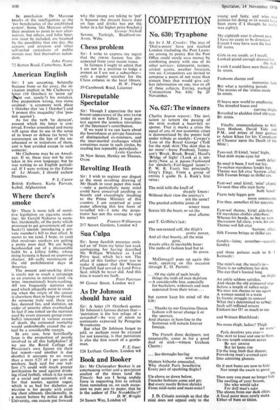COMPETITION
No. 630: Tryaphone
Set by J. M. Crooks: The joys of 'Dial-a-poem' have just reached London (including the Poet Laure- ate among its poets). But the Post Office could surely save money by combining poetry with one of its other services: teletourist, recipes, cricket scores, weather forecasts, TIM etc. Competitors are invited to compose a poem of not more than sixteen lines that would give cal- lers information on one, two or all of these subjects. Entries, marked 'Competition No. 630; by 27 November.
No. 627: The winners
Charles Seaton reports: The invi- tation to lament the passing of the mini evoked a heart-felt re- sponse. That it marks a crisis the equal of any of our economic crises is demonstrated by the poems laid under tribute as models: Cowper's 'Loss of the Royal George' (Toll for the midi skirt/The skirt that is no more'—Irene Poulton), Tenny- son's 'Break, Break, Break', Hood's 'Bridge of Sighs' ('Look at it ten- derly/Now as it passes/Fashioned for slenderly/Fair-legged lasses'— P. W. R. Foot), but principally Gray's Elegy. From a group of entries I quote N. J. Rock's first verse:
The midi tolls the knell of shapely knees: Without their view the journey's not the same!
The gnarled arthritic joints of winter trees Scarce lift the heart, or set the soul aflame.
and T. Griffiths's last: The sun-tanned calf, the thigh's erotic power, And all that beauty, all the mini gave, Awaits alike th'inevitable hour: The paths of fashion lead but to its grave.
McGonagall pops up again this week, speaking on this occasion through E. 0. Parrott: ... Of the sight of such lovely things the midi all men depriyes —A considerable loss, especially for bachelors, widowers and men separated from their wives ...
but cannot keep his mind off the kilt: ... Thanks to our Gracious Queen fashion will never change it or the sporran, And changes in hem-line to the Scotsman will remain forever foreign.
The French dress designers, not unnaturally, come in for a good deal of stick—witness Graham Cherry: • See-throughs having now revealed Matters hitherto concealed, Why should Paris bowdlerise Every pair of sparkling thighs?
Up above or down below, Frenchy fashions come and go; But every manly Briton shrinks From midi-nette and maxi-minx I. D. Crispin reminds us that the mini does not appeal only to the young and lusty, and wins No guineas for doing so (it would have been more if I thought he really was eighty); My eightieth year is almost past, I have no cause to be downcast Except I may have seen the last Of minis.
Girls in my youth, as I recall, Looked grand enough dressed for the ball. I wish I could have seen them all In minis.
Fashions change and memories fade But what a ravishing parade The missies of the 'sixties made In minis.
0 brave new world to emphasise The dimpled knees and curving thighs Revealed to gladden tired old eyes By minis.
Finally, commendations to Wil- liam Hodson, David Tidy and P.M., and prizes of four guineas to Adam Khan for his 'Compleynt -of Chaucer upon the Deeth of the Fare-wel. 0 kirtel, 'mini' hight, That doth myne eyne ful sooth delyt: So smal it been, I wol nat lye, To-rechen mavdenes lendes hye. Thenne woi Ich crye 'harrow. alias', Sith Fasoun bringe us thilke cas.
Fare-wel small kirtel, 'mini' cleped; To-seen thee ofte myn herte bath leped: Fayre lady legges gete noon constreynte Fro thee, unnethes til hir queynte.
Fare-wel thenne, kirtel alderlest; Of maydenes clothes alderbest : Whenas hir bende, ne bet ne wers Shewestow ful clere, y-wis, hir en. Thenne wol Ich crye 'harrow. alias', Sith Fasoun bringe us thilke cas.
(lendes—loins; unnethes—scareely, hardly) and three guineas each to B. J. Kennedy: The mini's out, the maxi's in— There is no substitute for skin. The eye that's feasted long on thighs An ankle seldom satisfies, And sleeps the old primaeval urge Before a length of sullen serge. We may not chance to see again A woman seated in a train In frantic struggle to conceal What she's determined to reVoaJ; Such self-inflicted misery Endears her 0! so much to me.
and William Blatchford: No more thigh, ladies? Thigh no more?
Paris deceives you ever—
One skirt to knee and one to floor, To one length constant never. Be not unwise But let hems rise Up the long limb that dances, Provoking man's averted eyes Into admiring glances.
Or if pert bums are now to hide Nor tempt the swain to goose 'em.
Then sure you must no longer hide The swelling of your bosom. She who would take For dull man's sake The gloom from our dark cities, A focal point must surely make Either of bum or titties.








































 Previous page
Previous page